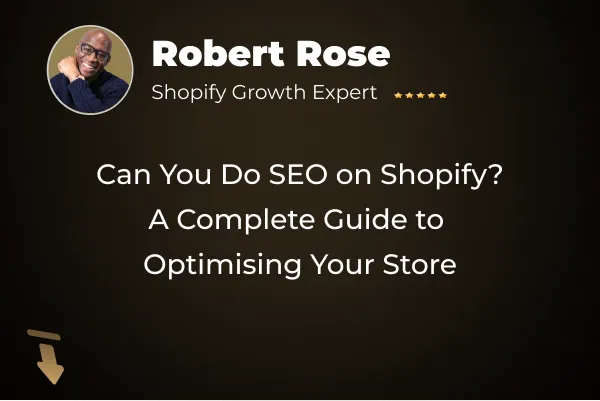
Can You Do SEO On Shopify? A Complete Guide to Optimising Your Store
TL;DR: Can You Do SEO On Shopify? A Complete Guide to Optimising Your Store
Yes, Shopify supports SEO with built-in tools and features for optimisation.
Keyword research is key—target long-tail keywords for better traffic.
Optimise product pages with unique descriptions, meta tags, and alt text.
Improve site speed by compressing images and removing unused apps.
Build backlinks through collaborations and directories to boost rankings.
Master Shopify SEO to drive organic traffic and sales!
As a Shopify store owner, you’ve likely wondered: Can you do SEO on Shopify?
The short answer is yes.
Shopify is not just a powerful e-commerce platform; it also provides tools and features that make search engine optimisation (SEO) straightforward and effective.
But here’s the thing: simply having a Shopify store isn’t enough to rank high on Google.
To truly unlock the potential of SEO on Shopify, you need a clear strategy and actionable steps.
In this guide, we’ll explain everything you need to know about Shopify SEO and provide a roadmap for increasing your store’s visibility, traffic, and conversions.
Why SEO Matters for Shopify Stores
Every online store owner dreams of more organic traffic; and high-quality visitors, who are actively searching for the products you sell.
Here’s why SEO is a game-changer for Shopify:
Cost-Effective: Unlike paid ads, SEO helps you attract traffic without a recurring cost. Once optimised, your store can continue to rank and bring in visitors 24/7.
Higher Conversion Rates: Visitors from organic search tend to be further along in their buying journey, making them more likely to convert.
Long-Term Results: While SEO takes time, the results are sustainable, helping you build a foundation for long-term growth.
Can You Do SEO on Shopify? Absolutely. Here’s How
1. Optimise Your Shopify Store’s Structure
Shopify makes it easy to set up a store, but your site structure plays a critical role in SEO. A clear, logical structure helps search engines crawl your store and ensures a seamless experience for your customers.
Actionable Step: Keep your navigation simple with easy-to-understand categories. For example, use clear collections like "Men’s Apparel" or "Gourmet Coffee."
Pro Tip: Use breadcrumbs to help customers and search engines understand your site’s hierarchy.
2. Conduct Keyword Research
Keywords are the backbone of SEO. They’re the bridge between what your customers are searching for and your products.
Actionable Step: Use tools like Google Keyword Planner or Ahrefs to identify keywords with high search volume and low competition.
Actionable Step: Focus on long-tail keywords like “eco-friendly yoga mats” for more targeted traffic.
3. Optimise Product Pages
Your product pages are where the magic happens. Proper optimisation can turn them into ranking powerhouses.
Actionable Step: Add primary keywords to product titles, descriptions, and meta tags.
Actionable Step: Use unique, engaging descriptions that highlight the benefits of your product. Avoid duplicating content from manufacturers.
4. Leverage Shopify’s Built-In SEO Features
Shopify offers several built-in tools to make SEO easier.
Actionable Step: Use the built-in fields for meta titles and descriptions to improve click-through rates.
Actionable Step: Add alt text to your images to help them rank in image search results.
👉 Learn More: Shopify's Guide to SEO
5. Boost Your Store’s Speed
Page speed is a crucial ranking factor. A slow-loading store can frustrate users and hurt your rankings.
Actionable Step: Compress images with tools like TinyPNG.
Actionable Step: Remove unused apps and use Shopify’s online store speed report to monitor performance.
6. Build High-Quality Backlinks
Backlinks are like votes of confidence for your store. The more high-quality sites link to you, the more Google trusts your content.
Actionable Step: Reach out to bloggers and influencers in your niche for guest posts or collaborations.
Actionable Step: Submit your store to relevant directories.
What Shopify Offers to Help with SEO
Shopify is built with SEO in mind. Here are some features that make it SEO-friendly:
Mobile Responsiveness: Shopify themes optimised for mobile are essential for SEO.
SSL Certificates: All Shopify stores come with free SSL, building trust with customers and Google.
Customisable URL Structure: You can edit your URLs to make them clean and keyword-rich.
👉 Helpful Resource: Shopify SEO Manual
Common Shopify SEO Mistakes to Avoid
Duplicate Content: Avoid using the same product descriptions across multiple pages.
Ignoring Analytics: Regularly check your performance using tools like Google Analytics and Search Console.
Neglecting Internal Links: Link to related products and collections to improve navigation and rankings.
Conclusion: Unlock Your Shopify Store’s Potential with SEO
So, can you do SEO on Shopify?
The answer is a resounding yes.
With the right tools, strategies, and a commitment to continuous improvement, your Shopify store can dominate search engine rankings.
SEO is not a one-time task; it’s an ongoing process.
But the rewards? More traffic, more sales, and more growth.
P.S. What’s your biggest challenge with Shopify SEO?
Let me know in the comments—I’d love to help!
